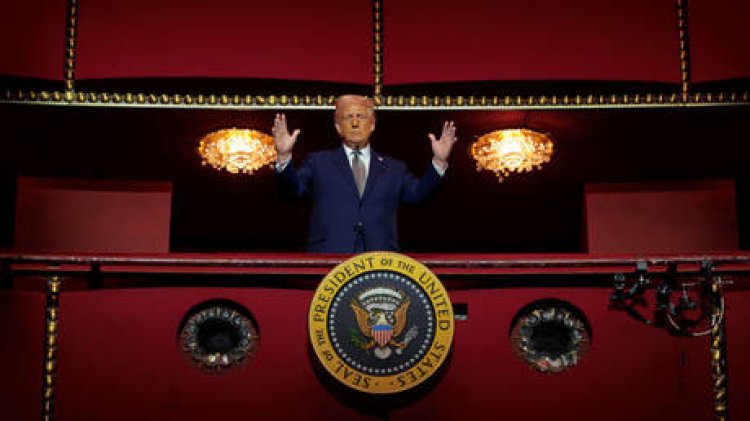Dmitry Trenin Proclaims "Liberalism is dead," Outlining the Subsequent Ideological Shift
<b>In Trump’s World, Great Powers Don’t Preach – They Compete</b> The term “changing world order” is often heard in discussions of international relations. However, what frequently gets overlooked is the speed at which these changes are taking...

The term “changing world order” is often heard in discussions of international relations. However, what frequently gets overlooked is the speed at which these changes are taking place and who is driving them.
Typically, shifts in global power dynamics arise from crises, such as wars among dominant nations or internal upheavals. Historical examples include the shifts witnessed between 1939-1945 and again from 1989-1991. Usually, issues build up over years or decades, culminating in a sudden change, akin to tectonic plates moving and triggering an avalanche that reshapes the landscape. Recently, we've observed a similar phenomenon, primarily led by the United States, the very state that has staunchly defended the remnants of the former world order.
The anticipated decline of unipolarity has emerged ahead of schedule. The United States, traditionally the enforcer of liberal internationalism, is no longer attempting to halt the shift toward a multipolar world; under Donald Trump, it has actively embraced it.
This transition is more profound than a mere campaign promise or a shift in rhetoric; it constitutes a structural break. Within a matter of weeks, the U.S. has transformed from a nation resisting multipolarity to one seeking to assert dominance over it—shifting focus from moralism to realism. In this process, Washington may inadvertently bring about the very outcome its predecessors endeavored to prevent.
Trump’s new approach carries significant and enduring consequences. The leading global power has forsaken its role as the guardian of liberal globalism in favor of a more pragmatic stance centered on great power rivalry. The discourse surrounding human rights and democracy has been replaced with “America First”, encompassing not just domestic, but also foreign policy.
The new U.S. administration has set aside the symbolism of movements like Black Lives Matter and Western liberal ideals, opting instead to confidently display the American flag, signaling a shift in U.S. foreign policy toward interest-based relations.
This transformation is not hypothetical; it represents a geopolitical earthquake.
Firstly, multipolarity has shifted from being a mere concept to a tangible reality. Trump has repositioned the U.S. from an enforcer of unipolarity to a participant within a multipolar framework. His doctrine of “great power competition” is more aligned with realist principles than with the post-Cold War liberalism that had long dominated Washington's approach.
From this perspective, the world consists of sovereign powers—namely the U.S., China, Russia, and India—each pursuing their own interests, sometimes at odds, sometimes in alignment. Cooperation results not from shared values, but from mutual necessities; a dynamic with which Russia is well-acquainted and often thrives.
Secondly, Washington's move towards realism signifies a fundamental shift in its global engagement strategy. The era of liberal interventions is behind us. Trump has reduced funding for USAID, cut “democracy promotion” budgets, and expressed readiness to collaborate with various regimes if it serves American interests.
This marks a departure from the binary moral perspectives of the past and, ironically, resonates more closely with Moscow’s worldview. Under Trump, Washington appears less focused on exporting liberal values and more inclined toward power negotiation.
Thirdly, the West as we once understood it has unraveled. The cohesive liberal “collective West” characterized by shared ideology and transatlantic unity has effectively ceased to exist in its former guise. The U.S. has retracted from this alliance, prioritizing its national interests over globalist agendas.
What remains is a fractured West, divided between nationalist-led administrations like Trump’s and traditional liberal strongholds in cities such as Brussels, Paris, and Berlin. The ideological clash between nationalism and globalism has become the defining political struggle within the West.
This ongoing struggle is far from resolved. Although Trump’s influence might seem dominant, there is still considerable domestic opposition. If Republicans are unsuccessful in the 2026 midterm elections, his ability to realize his agenda may face constraints. Moreover, the constitutional restriction preventing him from running again in 2028 adds urgency to his political maneuvering.
As the West divides, a new “World Majority” is gaining strength—an informal coalition of states that lie outside the Western bloc. Initially defined as those that refrained from sanctioning Russia or supplying arms to Ukraine, this coalition now reflects a broader geopolitical realignment.
The World Majority is not a formal alliance but embodies a shared stance: prioritizing sovereignty over subjugation, trade over ideology, and multipolarity over hegemony. Groups like BRICS and the SCO are evolving into genuine alternatives to Western-dominated institutions, with the global South asserting itself as a significant arena.
We are witnessing the consolidation of a new “Big Three”: the U.S., China, and Russia, with India poised to join. These entities may not share ideological goals, but they are civilizational powers, each charting its own course.
Their interactions are pragmatic rather than sentimental. For instance, China has adeptly balanced its strategic partnership with Russia amid the Ukraine conflict while still accessing Western markets. This is not treachery; it’s astute diplomacy, indicative of the transactional nature of relations in a multipolar landscape where each player safeguards its own interests.
Moscow’s evolving role in this new world order is significant. Emerging from the last two years more self-sufficient, assertive, and central to the global framework, the war in Ukraine has altered perceptions of Russia.
Once considered a junior ally or regional power, Russia is now engaging on equal footing with leaders in Washington, Beijing, and New Delhi. This change is evident not only in diplomatic efforts but also in the development of global supply chains, enhanced BRICS collaboration, and an increased reliance on national currencies for trade.
Having established itself as one of the world’s foremost powers due to the conflict in Ukraine, Russia now stands ready to claim its rightful place in this evolving landscape. It is imperative to remain vigilant and avoid complacency. America’s shift to realism is, in part, a response to the successes of the Russian military, the resilience of its economy, and the unity of its people.
The focus now should be on capitalizing on this momentum. Although the U.S. may have embraced realism, it remains a competitor. Russia needs to bolster its technological independence, deepen ties with Asia, and pursue a foreign policy grounded in realism rather than nostalgia.
It should continue to monitor internal developments within the West—specifically the U.S. electoral process and the strains within the EU—while reframing its own policies to be less dependent on Western validation. Furthermore, as relations with Western European nations grow increasingly strained in light of ongoing dialogue with Washington, the strategy toward these countries should be calculated and discreet.
Western unity is becoming more conditional and transactional, rife with contradictions. Political shifts in nations like France, Germany, and Italy may heighten instability, and the prospects for integration appear uncertain. Russia's engagement should be strategic—open-eyed and cautious.
The new world order does not need to be formally announced; it is already unfolding. We have transcended theoretical discussions. Now, the contest for advantage begins in earnest. The world has transitioned to a multipolar framework not merely by design but due to an actual shift in power dynamics. Trump may not have catalyzed these changes single-handedly, but he has unquestionably accelerated their progression.
Russia’s current task is not merely to challenge the old order, but to ensure it secures its position within this new one.
Ramin Sohrabi for TROIB News












